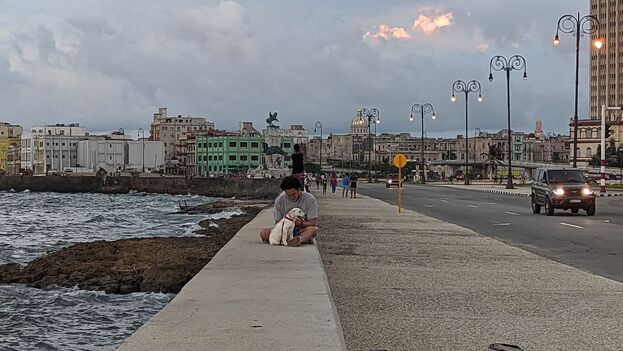
![]() 14ymedio, Havana | 26 October 2021 — Vaccines and other biological products for veterinary use “can be vehicles for building diverse and powerful biological weapons.” That is the argument of the Ministry of Agriculture of Cuba to prohibit its importation and its exclusion in Resolution 430/2021.
14ymedio, Havana | 26 October 2021 — Vaccines and other biological products for veterinary use “can be vehicles for building diverse and powerful biological weapons.” That is the argument of the Ministry of Agriculture of Cuba to prohibit its importation and its exclusion in Resolution 430/2021.
The agency considers that “veterinary vaccines, antisera, culture media, products obtained by genetic engineering and genetically modified organisms” may “contain in their composition strains of pathogenic microorganisms different from those that circulate” in Cuba, and that this type of aggression has been used by the United States.
Pharma biologist chemist Ernesto Mediola assures 14ymedio that he understands Cuba’s position, but does not share the bans “because the drugs are regulated and go through meticulous health protocols.”
“Strictly speaking, viruses, bacteria, toxins, to name a few, could be used to cause disease, but to state that a patented vaccine is the basis of a biological weapon is an extreme position.”
The news has not been well received by a community of animal lovers and protectors that have been waiting for months for veterinary drugs, and vaccines in particular, to reach clinics and stores in the country. Stories of critically ill or dead animals from preventable diseases can be heard everywhere.
“We placed an ad stating that we would be willing to pay whatever it took to buy it here because last year we had another little puppy die from distemper”
Duque died of parvovirus when he was only six months of age. The vaccine that was needed to immunize him against the disease did not reach Cuba in time, after an emigrant cousin sent the owner of the puppy a dose of the pentavalent that also immunizes against distemper, adenovirus, hepatitis, and kennel cough.
“We placed an ad stating that we would be willing to pay whatever it took to buy it here because last year we had another little puppy die of distemper,” the troubled owner of the two dead animals told this newspaper. “But they are practically not selling it on the black market because, with the reduction of flights, they almost never arrive.” In addition, the vaccine must maintain a strict cold storage chain.
Roberto Miró, who runs a small place where he trims animals’ nails and treats them against scabies and ticks in Santo Suárez, explains to this newspaper that “you have to buy the vaccine only from a source in which you have a lot of confidence because, if the packaging was not at the right temperature all the time, it’s like throwing your money away.”
A dose of pentavalent exceeds 1,500 pesos in the informal market and there isn’t a constant supply. Most of the veterinarians who practice privately, seeing animals in their homes, have preferred to withdraw immunization with these antidotes from their catalog of services. “What would I have to charge to give the injection if the vaccine costs me that much? Few clients are willing to pay that amount,” Miró acknowledges.
In the main veterinary clinics of Havana, the product has been conspicuous by its absence for more than a year, even in the exclusive Almiquí, with high prices in convertible currency, the pentavalent has barely arrived a couple of times in recent months. “Animals die of diseases that would be very easy to prevent with a timely vaccine,” says Miró.
The Ministry of Agriculture also prohibited the import-export of “hormones and growth promoters, drugs, narcotics, psychotropics, blood samples, strains of microorganisms” and equipment, devices and materials for veterinary laboratory diagnosis.
In the information offered for travelers, the agency specified that the importation of antibiotics for veterinary use is permitted, as well as antifungals, antiparasitics, vitamin supplements, instruments and accessories for pets, which must be in their “original containers, duly labeled and identified with the commercial and generic name or international common denomination.”
“My dogs have not been able to go out to the street for almost two years because I have not been able to vaccinate them”
Mendiola believes that the ban is more aimed at the centralism of a government that is questionable, given the lack of medications. Cuba has reached such extremes that, in the face of the scabies plague they are experiencing, those affected have had to resort to an antiparasitic that is used in animals. “It is not recommended because it can generate adverse reactions. Before prohibiting, Cuba should open the entry of drugs in general,” warns the chemist.
In the absence of protection, many pet owners reinforce the measures. “My dogs have not been able to go out to the street for almost two years because I have not been able to vaccinate them. I already suffered a lot with the death of a ten-year-old dog who got sick with distemper and I do not want to go through that again. What we do is leave them at home and we have rags with chlorine at the entrance to clean our shoes and avoid bringing them diseases from the outside,” says a resident from El Cerro.
“We have American pentavalent, just brought from Miami,” states an ad in one of the most popular sites of classifieds sales in Cuba. I administered it to the animal at home,” it reads. “Life is priceless,” the ad concludes immediately after the price of the drug: 1,800 pesos.
____________
COLLABORATE WITH OUR WORK: The 14ymedio team is committed to practicing serious journalism that reflects Cuba’s reality in all its depth. Thank you for joining us on this long journey. We invite you to continue supporting us by becoming a member of 14ymedio now. Together we can continue transforming journalism in Cuba.
